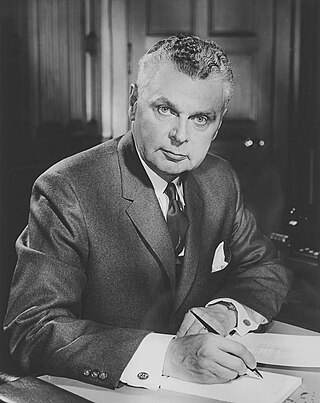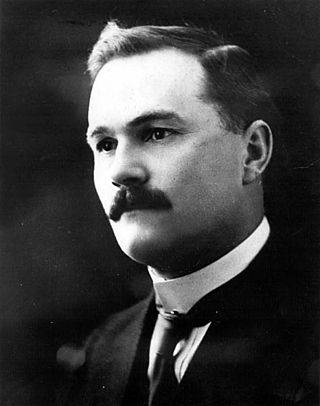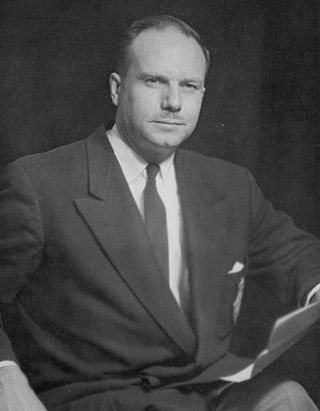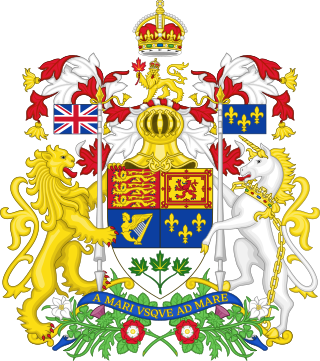Related Research Articles

John George Diefenbaker was a Canadian politician who served as the 13th prime minister of Canada, from 1957 to 1963. He was the only Progressive Conservative party leader between 1930 and 1979 to lead the party to an election victory, doing so three times, although only once with a majority of the seats in the House of Commons.
Unity, United Progressive Movement and United Reform were the names used in Canada by a popular front party initiated by the Communist Party of Canada in the late 1930s.

Charles Avery Dunning was the third premier of Saskatchewan. Born in England, he emigrated to Canada at the age of 16. By the age of 36, he was premier. He had a successful career as a farmer, businessman, and politician, both provincially and federally.

The 1925 Canadian federal election was held on October 29, 1925 to elect members of the House of Commons of Canada of the 15th Parliament of Canada. The Conservative party took the most seats in the House of Commons, although not a majority. Prime Minister William Lyon Mackenzie King's Liberal Party was invited to form a minority government. Unlike the Conservative party, King's Liberals had the conditional support of the many Farmer/Progressive MPs.

Francis Alvin George Hamilton was a Canadian politician. Hamilton led the Progressive Conservative Party of Saskatchewan from 1949 until he was elected to the House of Commons of Canada in the 1957 general election. That election brought the federal Progressive Conservative Party of Canada to power under John Diefenbaker. He served as Minister of Northern Affairs and National Resources, 1957 to 1960. He promoted a new vision of northern development. He was Minister of Agriculture, 1960 to 1963, where he promoted wheat sales to China.

The 1945 Canadian federal election was held on June 11, 1945, to elect members of the House of Commons of the 20th Parliament of Canada. Prime Minister William Lyon Mackenzie King's Liberals won a third term. The party fell five seats short of a majority but was able to rule as a majority government with the support of Independent Liberal MPs.
The Liberal–Labour banner has been used several times by candidates in Canadian elections:

Prince Albert is a federal electoral district in Saskatchewan, Canada, that has been represented in the House of Commons of Canada from 1908 to 1988, and since 1997.
Brian Fitzpatrick is a Canadian politician.

The 20th Canadian Parliament was in session from 6 September 1945, until 30 April 1949. The membership was set by the 1945 federal election on 11 June 1945, and it changed only somewhat due to resignations and by-elections until it was dissolved prior to the 1949 election.
The timeline of elections in Canada covers all the provincial, territorial and federal elections from when each province was joined Confederation through to the present day. The table below indicates which party won the election. Several provinces held elections before joining Canada, but only their post-Confederation elections are shown. These include:

Randy C. Hoback is a Canadian politician who was elected to represent the electoral district of Prince Albert in the 2008 Canadian federal election. He is a member of the Conservative Party. He was subsequently re-elected in the 2011, 2015, and 2019 federal elections.

Frank Exton Lennard was a Conservative then a Progressive Conservative party member of the House of Commons of Canada. He was born in Dundas, Ontario and became a merchant and textile dyer by career.
George James Tustin was a Progressive Conservative party, National Government and Conservative member of the House of Commons of Canada. He was born in Todmorden, Ontario and became a merchant and theatre owner by career.

Ronald Stewart Moore was a Canadian politician from Manitoba. He served as a Co-operative Commonwealth Federation MP in the House of Commons of Canada from 1945 to 1949 representing the riding of Churchill.
King Hazen was a Progressive Conservative party and National Government member of the House of Commons of Canada. He was born in Fredericton, New Brunswick and became a barrister by career.
Charles M. McDonald was a Canadian politician who served in the Legislative Assembly of Saskatchewan and in the Parliament of Canada. He has the distinction of having served in both the House of Commons of Canada and the Senate of Canada for less than a year.
Andrew Knox was an Irish-born farmer and political figure in Saskatchewan, Canada. He represented Prince Albert in the House of Commons of Canada from 1917 to 1925. He was elected to Parliament in the 1917 federal election as a Liberal-Unionist supporter of Sir Robert Borden's wartime Union Government. After the war, he crossed the floor to join the new Progressive Party.

This article is the Electoral history of John Diefenbaker, the thirteenth Prime Minister of Canada.
References
- 1 2 Normandin, Pierre G. (1950). Canadian Parliamentary Guide.
- 1 2 "George Dyer Weaver". Manitoba Historical Society. 3 January 2009. Retrieved 23 June 2009.
- ↑ "Saskatchewan Cemeteries Project" . Retrieved 28 March 2010.